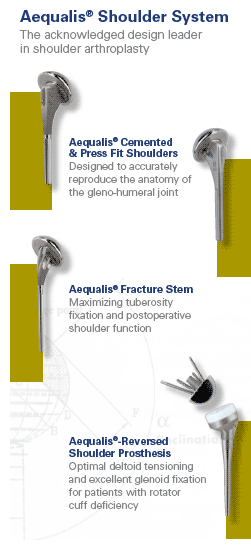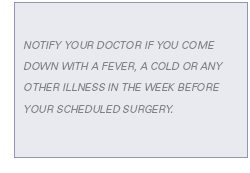Going for Shoulder Surgery (A Patient Guide)

Shoulder Joint Replacement = Shoulder Arthroplasty
If you are considering shoulder joint replacement surgery or shoulder arthroplasty [ar-throw-plas-tee], this page may contain some helpful information.
Although shoulder replacement is less common than hip or knee replacement, it is a very successful surgery. The success depends upon;
- the condition and quality of the bone.
- the type and severity of arthritis.
- the condition of the muscles around the shoulder.
- age, activity level, overall health.
- your commitment to shoulder exercises after surgery.
How can shoulder replacement surgery (shoulder arthroplasty) help?
- Reduce or eliminate shoulder pain and regain range of motion.
- Return to normal daily activities that were previously limited by the shoulder damage.
- Success will depend on your age, activity level, and other factors.

Will I have pain?
After initial pain from the surgery subsides, you should not have any chronic pain as a result of the implant.
- You may have some muscle soreness as you strengthen your muscles, but that will begin to improve as your muscles strengthen.
- Call your physician if you have any increased pain, swelling, fever, or abnormal incision drainage.
Are there any Complications?
As with any surgery, there is always a risk of complications. Infection, dislocation, postoperative fractures and glenoid component instability are the most common complications in shoulder implant surgery. However, advances in surgical techniques and prosthetic technology innovations are helping to reduce the occurrence of complications.

Cost?
Insurance coverage is provided for this surgery. Ask your insurance provider for more information.
What does the surgery involve?
Meeting with the Orthopaedic Surgeon:
- Bring your primary care physician’s name and contact information
- PHYSICIAN NAME
- TELEPHONE
- ADDRESS
- Bring results of tests done to assess your (X-rays, MRI, medical records related to your shoulder…).
- List of your medical conditions, health problems, and all previous operations.
- List of medications (or bring the bottles).
- Any allergies or adverse reactions you’ve had to drugs or anesthesia.
- Any dietary restrictions.
- Clearance (by your physician) for surgery must be sent to the orthopedic surgeon.
The surgeon will perform an orthopedic exam for assessment of pain level and range of motion.
Weeks Before Surgery:
- Schedule dental work well in advance of your surgery and do not schedule any dental work or routine cleanings for several months after your surgery.
- It is possible to give blood in the event it may be needed during surgery. As with all surgery, this is a personal choice that IF needed, you could receive your own blood (or donation from matching friend or relative).
- Pick up throw rugs or other items that may be easily tripped over.
- Arrange items that you will use regularly so they are within low reach (telephone, radio, TV remote, bathing items, plates and drinking glasses, medications). Many of these items may already be in appropriate locations depending on your lack of shoulder mobility before surgery.
- Prepare and freeze a few weeks worth of meals that can be easily re-heated.
If you live alone or have special needs;
- You may need to transfer to a rehabilitation facility after discharge. Ask your doctor or hospital staff for help
- Arrange for someone to drive you home and possibly stay at your home for a few days.
- If you use a walker or wheelchair, you will need to arrange for alternative mobilization help until your shoulder is strong enough (e.g. motorized chair)

24 Hours Before Surgery
- Nothing to eat or drink after midnight before your surgery.
- Take a shower or bath to help reduce the risk of infection.
- Do not shave or apply lotion to the area of the surgery.
- Remove all nail polish and make-up.
- Take all normal medications unless the doctor instructed you not to (such as “blood thinners” aspirin, coumadin) ASK your doctor if you are not sure.
- Pack to bring a hospital bag with non-skid slippers, a robe or gown, something to read, copies of your insurance cards, medications you regularly take and other personal items. Pack a loose-fitting sweat suit or pants and comfortable shoes for the ride home.
- Do not bring valuables, cash, credit cards or jewelry.
- Make arrangements for someone to drive you home from the hospital
Morning of Surgery
- Do not drink any liquids, including water or ice chips – you may brush your teeth but do not swallow any water.
- Make sure to have an empty bladder.
- An intravenous (I.V.) line will be started by the nurse to administer medications before or during the surgery.
- A medication may be given to help you relax and to dry your mouth and sinuses.
- You will be transferred to a stretcher prior to going to the operating room.
- The anesthesiologist will meet with you to discuss the type of anesthesia to be used.
During Surgery
A small incision is made over the front part of the shoulder – (4-8 inches long from the collarbone to the point where the deltoid muscle is attached to the upper arm bone. )
Surgeons take great care to avoid tearing muscles or injuring nerves and blood vessels. The implants come in a variety of sizes and the surgeon fits the prosthesis to the patient.
After Surgery
The hospital stay is generally 1-3 days and you will go home with the arm in a sling. A physical therapist will guide you through your exercise routine to be performed at home.

Recovery and Return to ACTIVITY
At Home:
- Total recovery period is 3-6 months.
- Wear the sling every night for at least the first month.
- Initially, push yourself up in bed or from a chair using your non-surgical arm.
- Follow your program of home exercises and don’t do more than prescribed, as overuse of the shoulder can be harmful.
- No sports or heavy lifting for at least six weeks.
- Get home support if you need it.
The Bandage Dressing:
- While at home change dressing daily.
- You should see your doctor 10 to 14 days after surgery to remove the staples in your wound.
- You should not drive until the shoulder is strong enough to hold the arm in the horizontal position straight out in front of you.
- Your physician will let you know when it is safe to drive.
The Shower:
- You may shower and get incision wet 72 hours after surgery if there is no drainage coming from the wound.
- No swimming or submerging for two weeks or until the wound is completely healed.
Disclaimer
This web site contains general medical information and does not replace the medical advice of your physician. If you have questions about your medical condition or exercises, ask your doctor or health care provider.
